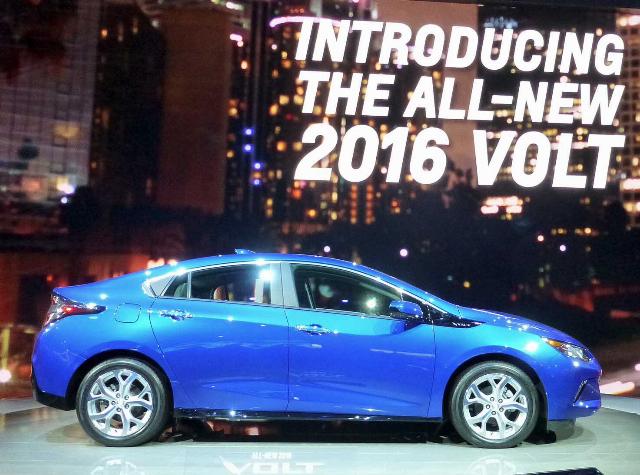Another Democrat backed company goes belly up. Not to good at picking winners? Links below
I’ve been writing about electric vehicles since 2011, the heady days of the Chevy Volt, as Chevy’s ads then proclaimed it: “The car we had to build.” What they meant was the Obamites were forking over taxpayer cash for electric vehicles (EVs), and also threatening auto manufacturers to do their bidding, and of course, bailing out everyone but Ford, which is why I’ve been driving Fords since.

Graphic: Lateral view 2016 Chevy Volt. Wikimedia Commons.org. CCA-SA 2.0 Generic.
Obama, promoting a dead horse, told auto workers when he left the White House he’d buy a Volt. As one might expect, this promise, as with all Obama promises, had an expiration date. He never bought one. Years before Obama left office, I predicted when he did GM would wait a decent interval and discontinue Volt production, and that’s what happened. They lost truckloads of cash on every Volt they built. GM denied it, which is unsurprising in a publicly traded company not wanting to admit they were throwing money, and shareholder dividends, away.
One of the cheers electric vehicle cheerleaders trot out is the idea if only EV manufacturers standardized battery packs, that would solve the range/time problem. All an EV driver need do is pull into a service station and within minutes their battery would be swapped for a fully charged battery and they’d be on their way.
Yeah. About that…
EV batteries are very big, weigh at least 1000 pounds and are designed as part of the vehicle’s structure. Replacing one is a dangerous and time-consuming matter, and costs 1/3 or more of the MSRP, which is averaging in the $67,000 range. While it would theoretically be possible for manufacturers to agree on a unibattery, that would require astronomically expensive redesign and retooling, and would of necessity slow, or completely halt, innovation.
There goes competition. If a manufacturer wanted a more powerful battery, how could they market that? If they developed a battery with much greater range than the unibattery, what then? Would the entire market dump the current unibattery and build the better battery, or would a single manufacturer be tempted to break the compact and market their better battery to make bigger profits? And with everyone stuck with batteries of a single size, how could innovation possibly work? A single battery design wouldn’t work for everything to subcompact sedans like the Chevy Bolt to full sized SUVs, so there goes the unibattery idea.
It would also require a common design for removing and replacing batteries. Would that be from the back? Front? Sides? Or would special lifts to remove and replace unibatteries from the undercarriage be required? Standard lifts with a single post more or less in the middle of vehicles obviously wouldn’t work.
EV batteries hold an enormous amount of energy, requiring special training and tools to avoid electrocuting mechanics, or causing fires or flaming explosions, but we’ll get to this, and related problems, shortly.
And what of unscrupulous EV owners with batteries on their last legs? The more, and more completely, EV batteries are charged, the faster they lose their capacity to fully recharge. They pull into a battery station, get a new battery, and stiff the station for their next to useless battery. Unless there is a more or less instantaneous way to tell if a battery is all but used up, this is a deal breaker. And what of battery thieves?
And here’s the worst part. America has a nearly endless network of gas stations, built up over the last century plus. Most of those are also convenience stores, and many are open 24 hours. Few, if any, gas stations anymore have mechanics or do mechanical work.
The only way such a battery network would work is if there was a unibattery, and hundreds of thousands of battery stations, open ‘round the clock, to service EVs. We’ve already figured out there can’t be a unibattery that would be too big for small EVs and too small for big EVs, and no one is going to pay to build such stations unless there is sufficient demand, and circa 2024, Americans have figured out they don’t want, and aren’t going to buy, EVs.
And this particular EV cheer requires battery swaps as rapid as filling a conventional vehicle with gas, and no more expensive. Are stations going to be happy with the honor system, or will they need deposits? Can one mechanic handle a swap, or will more be required? What station could afford multiple mechanics on three rotating shifts 24/7/365? Who could afford, particularly in comparison to gas costs and convenience, to pay mechanic’s wages and a deposit for a battery swap?
Sadly(?), this cheer is going to die its inevitable death. EVs will remain a niche product, the playthings of the well-heeled.
https://www.americanthinker.com/blog/2024/07/electric_vehicles_the_magical_unibattery.html
https://www.wired.com/story/fisker-went-bankrupt-what-do-its-ev-owners-do-next/
https://nypost.com/2023/08/08/biden-backed-electric-vehicle-company-files-for-bankruptcy/

No comments:
Post a Comment